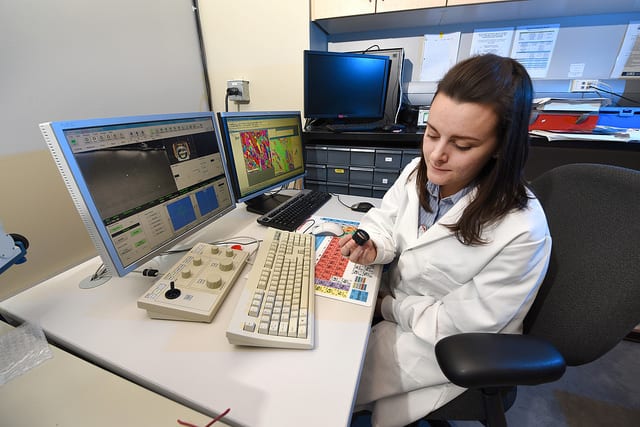Do STEM internships for high school students really exist? The answer is “Yes, they do!” While you may think that internships are only intended for college students, it is possible for industrious, mature, and motivated high school students to secure internships in the fields of technology, engineering and science.
While high school internships are not the norm, if you are willing to put in the effort, they are possible to find. Equally important, though, is having a realistic outlook on what an internship entails and understanding what you can expect to gain from the experience.
As a parent of a tech-minded high school student, I wanted to learn how students should go about finding a STEM internship and how to set realistic expectations. To get the inside track, I spoke with an expert in the field, Dr. Carole Jabbawy, Ed.D., founder of Internship Connection of Boston. Carole works with high school, college and gap year students to provide career guidance, resume and interview prep and access to internships. Since she regularly places high school students in STEM internships, I knew she could offer current information on finding the right internship.
I hope the following information will help you determine if your child is ready for an internship and give you some talking points in order to have a conversation.
How do I know if my child is ready for a high school internship?
In Carole’s experience, the following key attributes are a good indicator of whether a student is prepared to take on the challenges of an internship during high school.
- Strong work ethic
- Inquisitive
- Mature
- Focused
- Good time management skills
Regarding the last point, interns are often assigned specific projects, so it’s important to be able to see a project through from start to finish. Having good project and time management skills are a plus. By junior year, most high school students have worked on a number of individual and groups projects and can put their experience to use on the job.
What kind of skills should high school students have going into an internship?
In addition to having a strong interest in and some basic knowledge of a STEM field, students should have experience with Excel, PowerPoint and Word. Carole also noted that having strong writing skills are highly desired. An understanding of different social media platforms (e.g., Facebook and Twitter) is a benefit too– even if you’re working in a STEM field.
Tip: Email is still the main communication tool for businesses, but many young students don’t use it. It’s a good idea to spend time reviewing the importance of email as a communication tool and discuss best practices with your child.
What kind of STEM internships are available to high school students?
The availability of STEM internships for high school students will vary based on the type of companies, organizations, and universities in your area. Carole finds that STEM internships are often offered at startup companies. Fields such as clean energy, computers and technology, robotics and engineering are popular for internships but there are many others.
What can students expect to gain from the experience?
It’s a big deal for a high school student to step into the professional world, so it is a good idea to have a conversation with your child about expectations and what they hope to gain. Here are some of the things they might experience:
- Students will often get exposure to many aspects of the organization, not just the tech side of things. Carole said this often leads to discovering areas of study and work that students might not have been aware of or considered.
- Many tech internships allow students to do research and present their findings. It is also possible they will have the opportunity to create original content in the form of a blog and social media posts.
- A mentor can make all the difference! When Carole places a student in an internship, she makes sure that the student is assigned a mentor. She said that having someone who will take the student under their wing and provide guidance, support, and honest feedback is what can make the difference between a good internship and a great one.
- Students will learn what it’s like to work in a professional environment, including how to dress, how to communicate, how to be on time, and how to manage their time well.
Tip: During the interview process, be sure to ask about being assigned a mentor.
Student Story:
Kathy, from Acton-Boxborough Regional High School, said she enjoyed writing, business and science. She wrote for her school magazine and was on the regional science team. Carole helped combine all of her interests by establishing a communications internship at a state agency for the development and promotion of Life Sciences. Kathy interned for the Vice President of Communications and got experience writing press releases, media advisories and emails. She was also involved in researching prospective companies and even got to sit in on conference calls and attend Life Science events and board meetings.
Do companies provide students with training?
Students will absolutely learn new things and gain experience in ways they never could in the classroom. However, in order to determine if the fit is right, it is crucial to ask these types of questions during the interview and when an offer is made:
- What type of projects will I be working on?
- Will I be part of a team or working individually?
- Who will be my mentor?
- What will the day to day experience look like?
Student Story:
Brendan, a senior from Concord Carlisle High School, was interested in science, conservation and sustainability. He was able to work in production and conducted small engineering projects at a start-up that was developing an innovative and sustainable way to manufacture mosaics, using a robotic manufacturing process. Brendan remarked, “I learned a lot of math and science in school, but never had the chance to apply these concepts to real-life processes.” The internship gave Brendan the ability to apply those skills and he added, “Now I have come to understand the difficulty of taking the initial risk and am inspired by the entrepreneurial spirit and the hard worked involved.”
What’s the best way to find a STEM internship in high school?
Carole explained there are many different ways to find a high school internship:
- Talk with your high school science, math, technology and engineering teachers who may have connections in the area and know of specific opportunities. Guidance counselors are also a great resource.
- Keep your eye out on high school bulletin boards which are always filled with flyers about various educational experiences and summer programs.
- Work with a local company that provides high school students with “real-world” work experience through summer internships.
- Search online for local area opportunities using specific keywords based on your interests and geographic location. Try using “high school internship” in your search.
- Reach out to your local university and see if they have a high school internship or research program. People at universities are generally friendly and responsive if you contact them with inquiries.
- Search specific job websites to find high school internships. You can get a list of websites in an article I wrote called “Best websites for finding STEM high school internships.”
Do high school students need a resume, LinkedIn profile, or anything else to apply for an internship?
A brief cover letter and resume is the best approach to introduce a high school student to a potential internship organization. Carole has found that many high school students have activity sheets which can easily be turned into a business style resume.
Tip: There are many free online resume resources and some that cater to internships. Use Novoresume’s online resume builder to get ideas and create a resume.
Are high school internships paid or unpaid?
Generally, high school internships are unpaid– it’s more common for a college student to find a paid internship. Since students are in high school, Carole stresses the emphasis should be placed on having a “true educational experience.” She also points out that unpaid, part-time internships are a great option because students can still have time for a part-time paid job.
How many hours should students expect to work?
Summer is really the only time for a high school internship because students are too busy in the school year to dedicate the time needed for a meaningful internship. In Carole’s experience, 6-8 weeks is about the right amount of time to set aside during the summer, keeping in mind the internship may be 2-3 days per week. She finds that there is not enough meaningful work for a student to do every day and it’s more important to have valuable work during the time the student is present.
Tip: Companies appreciate students who are flexible with their hours.
Why would a company want to hire a high school student compared to a college student who may have more knowledge and work experience?
Carole said that companies usually do prefer college interns, assuming they will have more maturity and will have taken more courses that may be helpful during an internship. However, if a high school student presents a cover letter and resume that reflects true academic interest and prepares thoroughly for an interview, Carole has been told by mentors that this type of student maybe even more mature and dedicated then some college students.
Tip: Interview preparation is key. Have your child think about what they will say during an interview to convey their interest, maturity and the value they can bring to the job, even without college experience.
Final thoughts
High school internships are not for everyone, but for the curious student who has a deep interest in science and technology, the opportunity to work for a company in a STEM field is a great way to get tech experience and gain new skills before college.
I want to thank Carole Jabbawy of Internship Connection for taking her time to educate me about the world of STEM internships for high school students. Her realistic approach and pragmatic tips make a lot of sense and should help parents who want to be involved in the process.
Image Credit: Idaho National Laboratory









Comments on “The Inside Scoop on STEM High School Internships”
Hello Admin,
It is very nice that your blog is providing information regarding the program. I want to
aware you towards the “ Engineering Summer Internships for 2019-20.” These internships will provide you the
opportunity to gain hands-on experience.
Application Deadline is open
For more information, you can go through –
https://www.biginternships.com/engineering-summer-internships/